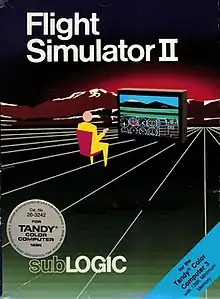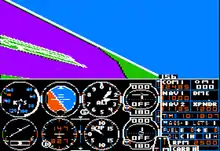Flight Simulator II (Sublogic)
Flight Simulator II is a video game written by Bruce Artwick and published by Sublogic as the sequel to FS1 Flight Simulator. It was released in December 1983 for the Apple II.[1]
| Flight Simulator II | |
|---|---|
 | |
| Developer(s) | Sublogic |
| Publisher(s) | Sublogic |
| Designer(s) | Bruce Artwick |
| Platform(s) | Apple II, Atari 8-bit, Commodore 64, PC-98, Amiga, Atari-ST, Tandy Color Computer 3 |
| Release | |
| Genre(s) | Amateur flight simulation |
| Mode(s) | Single-player |
Development

After the release of Flight Simulator for the IBM PC, Sublogic backported its improvements to other computers as Flight Simulator II.[1] This version, like the Microsoft release, does away with wireframe graphics for solid colors, and uses real-world scenery (although limited to a few areas in the United States). It includes the ability to load additional scenery from floppy disks.
Reception
InfoWorld in 1984 praised Flight Simulator II for the Apple as "a complicated but exhilarating game ... Bruce Artwick has really done it all", and stated that it was superior to Microsoft's version.[2]
Roy Wagner reviewed and compared Solo Flight and Flight Simulator II for Computer Gaming World, and stated that "This program is outstanding and certainly one of the best examples of excellent programming, documentation, and a full use of the capabilities of a microcomputer."[3]
II Computing listed it ninth on the magazine's list of top Apple II games as of late 1985, based on sales and market-share data,[4] and it was Sublogic's best-selling Commodore game as of late 1987.[5]
In 1996, Computer Gaming World declared Flight Simulator II the 79th-best computer game ever released.[6]
References
- Hockman, Daniel (April 1987). "Bruce Artwick's Flight Simulator / You've Come A Long Way, Baby! / The History of an Epic Program". Computer Gaming World. No. 36. pp. 32–34. Retrieved 23 April 2016.
- Mace, Scott (1984-05-07). "In Praise of Classics". InfoWorld. p. 56. Retrieved 6 February 2015.
- Wagner, Roy (August 1984). "Two Flight Simulators". Computer Gaming World. 1 (17): 28–29, 39.
- Ciraolo, Michael (Oct–Nov 1985). "Top Software / A List of Favorites". II Computing. p. 51. Retrieved 28 January 2015.
- Ferrell, Keith (December 1987). "The Commodore Games That Live On And On". Compute's Gazette. pp. 18–22. Retrieved 24 January 2015.
- "150 Best Games of All Time". Computer Gaming World. November 1996. pp. 64–80. Retrieved 25 March 2016.
External links
- Flight Simulator II at MobyGames
- Review in Softalk
- Review in ANALOG Computing
- Review in Compute!'s Gazette
- Review in The Rainbow
- Review in Info
- Review in Page 6
- Review in Page 6
- Review in Page 6